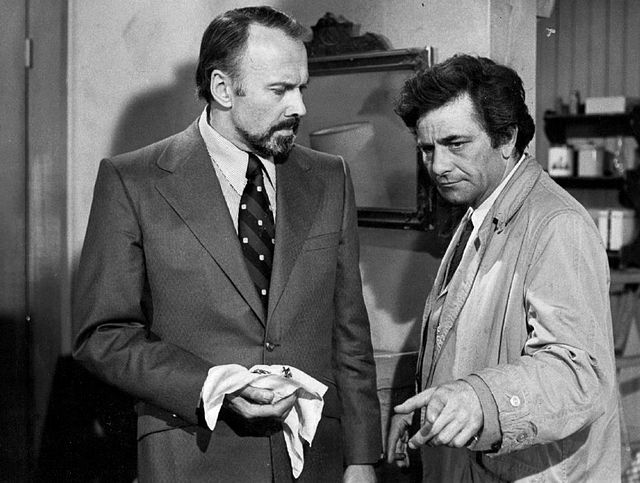
by David Martin-Jones
In part one of a series, David Martin-Jones, author of Columbo: Paying Attention 24/7, explores the resurgence of popularity for the beloved detective.
Columbo suddenly became famous again under lockdown. Why?
Is it because it is a fantastic show? Of course! But there is another reason. We should also consider “just one more thing …”.
Columbo contains a warning of great importance for our contemporary era of “fake news”, 24/7 attentive labour at screens, and ubiquitous surveillance culture, namely: that we must be constantly vigilant to how history is recorded. This, I argue in Columbo: Paying Attention 24/7 (and two online videoessays, more on which to follow), contributes greatly to the sense of relevance surrounding this classic show for our turbulent times.
Lockdown: The Return of Columbo
During the pandemic, several prestigious outlets published articles praising Columbo. For example, The New York Times lauded Columbo‘s clever mind games, its class warfare, and the array of excellent star performances amongst its murderers (July 2020), whilst the BBC exalted Falk’s famously flawless performance in the lead (September 2021). As I had been writing the book for several years this was no surprise. Part of what attracted me to Columbo was the duel between the Lieutenant and the murderer.



- The Men: from John Cassavetes to William Shatner to Matthew Rhys …



- The Women: from Lee Grant to Anne Baxter to Faye Dunaway …
Across 69 Columbos, the show really boasts some killer performances!
But I also felt that there was something of deeper significance about Columbo. Even though some of the reasons journalists gave for the enduring popularity of Columbo are true, and others are debatable (as Columbo fan communities know extremely well), how can we account for this zeroing in on Columbo specifically? Why not Kojak or The Rockford Files or Quincy, or any number of other popular shows of the era?
What truly marks Columbo out from these other shows is what makes it so relevant to today’s world — its engagement with how we pay attention to a world where labour involves looking at screens 24/7, and lives are increasingly lived under perpetual surveillance. The danger of this context, which Columbo alerts us to, is the ease with which the audiovisual record of history can now be falsified.
But surely this is just a fun detective show? How can we possibly see all this in Columbo?
Policing the Past
There are two key ways in which Columbo offers this warning:
1) Columbo‘s uniqueness is its opening revelation of the murderer. Even though we know whodunnit, we stay tuned. In part, this is down to Peter Falk’s genius performance. But in part, it is our enjoyment of the game-like nature of Columbo.
Columbo is a memory game. Its closest precursor is Kim’s Game: in which you are shown ten objects, they are covered up, and you have to remember them all. Similarly, with Columbo we have seen the opening murder, but did we spot all the clues which Columbo will use to nail the murderer? Were we paying attention? That is the test of memory that makes it so enjoyable to watch or rewatch an episode of Columbo.
2) Each episode showcases Columbo’s ability to pay attention. He does this 24/7, to the point of exhaustion. He is always on the case, always “looking and thinking”. Plus, Columbo uses the latest technologies to enhance his ability to pay attention. This means that he is forever paying attention to screens.
But what is Columbo is constantly looking for on-screen? A clue that will reveal a false alibi, OK. But another way to say this is, a manipulated account of the past. Columbo the attentive labourer seeks evidence that someone has been tampering with the audiovisual record of history to try to get away with murder. He polices the past 24/7, using the surveillance technologies which keep a duplicate audiovisual record of reality.

Columbo as Twenty-first Century Cop
This is what is so familiar about Twenty-first Century life which is anticipated in Columbo. The show encourages us to constantly pay attention to our world by labouring at screens. When watching an episode of Columbo we are like Columbo, testing our memory and keeping track of the world like a surveillance operative. Our job, as Columbo viewers, is just like his – to ensure that we pay close attention to the audiovisual record of history, to notice the clues which will enable the detective to catch the killer and set the historical record straight.
Thus Columbo seems so relevant today because it provides training for attentive labourers in a world duplicated by ubiquitous surveillance. Policing how history is reported is now a vital skill in an era of fake news and Orwellian “alternative facts”, one in which attentiveness may be ultimately prove vital to protect democracy.
Stay tuned for part two, where I explore how this is seen visually in Columbo, and the two videoessays I developed exploring this.
About the Author

Professor David Martin-Jones works in Film and Television Studies, University of Glasgow. He is the author/editor of 9 books. His research explores the links between film and television and contemporary society, including such topics as time, identity, ethics, ecology, and attention. Columbo: Paying Attention 24/7 is available now.




